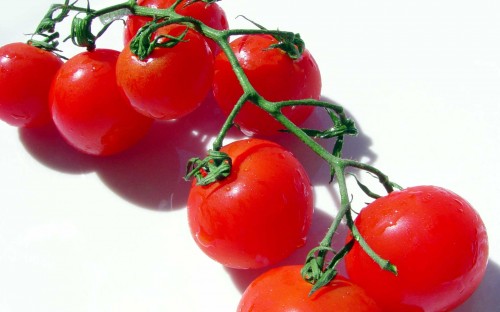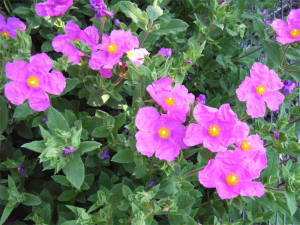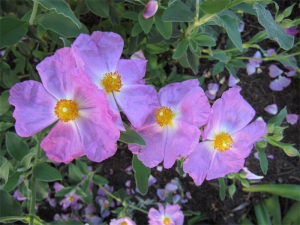 HOT, cold, hot, cold seems to be the weather pattern this spring, which makes it a challenge for gardeners and plants alike.
HOT, cold, hot, cold seems to be the weather pattern this spring, which makes it a challenge for gardeners and plants alike.
With regular winter rain at the right time, this spring has been one of the best for years. However, with continuing low temperatures at night, it is not only frost that kills tomatoes, but low temperatures generally.
Tomatoes are a tropical plant and exposure to temperatures below 13C can cause a severe physiological disorder such as cold-induced phosphorus deficiency.
At low temperatures tomatoes are unable to absorb phosphorus that is available in the soil, which can set their growth back.
Usually they recover as the days become consistently warmer, which is one reason why it is pointless planting out tomatoes too early, even if you want to beat every other garden in having toms before Christmas!
CISTUS is a hardy Mediterranean plant that will survive in almost any garden.
A couple of years ago, the Yarralumla Nursery promoted the white-flowered Cistus “Gallipoli Rose”, which was believed to have been brought back by a soldier from Turkey and planted in a garden in Victoria.Cistus is commonly referred to as “rock rose” due to its similarity to old-fashioned roses. But this common name also refers to many other plants such as Helianthemum, which raises the warning that it is wise to use common names with caution or possibly end up with the wrong plant.
The grey leaves of Cistus are a useful contrast to other plants. To varying degrees, its leaves are coated with a highly aromatic resin called Labdnanum, which reduces evaporation enabling it to survive high temperatures with low water usage during a summer drought.
Numerous varieties are readily available here including Cistus “Nightfall” with pale mauve flowers, C. ladanifer and C. salvifolia both with white flowers, C. crispus and C. “Sunset” both with pink flowers.Anyone new to growing Cistus should not be disturbed if all the petals drop at sunset, by next morning it will be in full flower again!
“LE Potager Encore” will be a fascinating talk by Paul Kirkpatrick, of Estate Gardening, Jamberoo, at the next the Horticultural Society of Canberra meeting at the Wesley Centre, National Circuit, Forrest, from 7.30pm, on Monday, November 17. All welcome.
THE Geranium and Fuchsia Society’s dazzling spring display is at St. James Church Hall, Gillies Street, Curtin, 9.30am-4pm, Saturday, November 22. Beyond demonstrations, teas and a plant stall, I talk on all things gardening at 11.30am.
Jottings…
- Always spray under leaves when combating insect pests.
- Apply Epsom salts to yellow leaves on Daphne. A heaped teaspoon to nine litres of water.
- Take the mower blades a couple of notches higher as the days warm.
- Prune Banksia roses after flowering
The post Gardening / Why tomatoes grow slow in the cold appeared first on Canberra CityNews.

